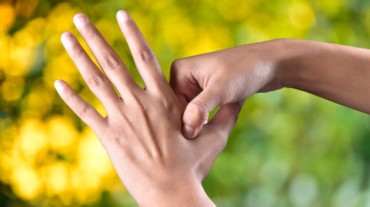
Cracking your knuckles might sound like music to your ears. You must be thinking, “oh what a relief” – but did you know this habit can wreak havoc on your bone health?
Yes, we know the elderly at home must have advised you against cracking your knuckles, because it is a bad omen. Well, we don’t really think it has anything to do with superstition, but a lot to do with your bone health.
Most of us feel relieved after making that sound, isn’t it? If you’re one of them, you need to read this piece to know why it’s bad for you.
1. Joint pain: If you think by doing this, you’re relieving your pain, the answer is a big NO. Instead, you’re inviting more pain in your fingers and wrist.
2. Swelling: If you crack your knuckles and twist your fingers or palm all the time, there’s a high chance of swelling.
3. Weak grip: Cracking knuckles creates cavities between the joints that can have an impact on your grip.
4. Reduced function of hand over time: This majorly happens in severe cases, says Dr Rakesh Nair, consultant knee replacement surgeon at Zen Super Speciality Hospital.
5. Thickening of the metacarpal cartilage
6. Pain and inflammation
7. Changes the shape of the joint
8. Crooked fingers

Well, we already told you there’s a feel-good factor attached to it, but here’s what Dr Nair has to say.
Cracking knuckles is something that we all do at some point in time. It helps you relieve stress in many ways, or that’s what most people feel. There are many people who are just habituated to this. But, it’s important to be mindful. Many crack their knuckles when they’re bored. It is difficult to explain the exact cause behind this.
“Someone may crack knuckles, when they’re anxious. Many believe that cracking knuckles reduces joint tension, increases mobility and they end up swearing by this habit. Even being nervous can make you crack your knuckles,” says Dr Nair.
He adds, “Functional hand impairment can occur. In serious cases, the fingers can be pulled out of the joint or the ligaments surrounding the joint can be injured.”

To reduce stiffness, you can opt for hot and cold therapy. Use an ice pack or place a hot bag on the affected area. Focus on the tendons and muscles, and do exercises or stretches that reduce pain and inflammation. These exercises will also reduce the stress on your joints.
“But, exercise or stretch only after consulting an expert and under the guidance of your fitness trainer. Opting for finger flexing and grip strengthening is also a good idea,” concludes Dr Nair.
Select Topics of your interest and let us customize your feed.
PERSONALISE NOWSo the next time you think of cracking those knuckles, remember what Dr Nair’s advice!
Get Latest Updates on Preventive Care, Family Care, Reproductive Care, Self Care